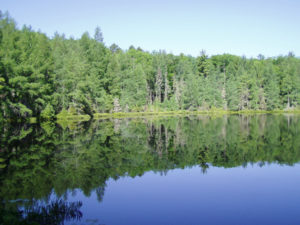 Using metagenome data sets collected over several years in northern freshwater lakes, a team led by researchers at Ohio State University and the DOE Joint Genome Institute (JGI) uncovered 25 novel sequences of virophages, parasites that live in giant viruses and use their machinery to replicate and spread. Virophages can alter the way viruses interact with other microbes, such as algae and cyanobacteria, which regulate the flow of carbon in freshwater lakes and help determine whether the bodies of water serve as sinks or sources for carbon. The identification of these novel sequences, reported in the October 11, 2017 issue of Nature Communications, doubles the number of virophages known since their discovery a decade ago. Read more on the JGI website..
Using metagenome data sets collected over several years in northern freshwater lakes, a team led by researchers at Ohio State University and the DOE Joint Genome Institute (JGI) uncovered 25 novel sequences of virophages, parasites that live in giant viruses and use their machinery to replicate and spread. Virophages can alter the way viruses interact with other microbes, such as algae and cyanobacteria, which regulate the flow of carbon in freshwater lakes and help determine whether the bodies of water serve as sinks or sources for carbon. The identification of these novel sequences, reported in the October 11, 2017 issue of Nature Communications, doubles the number of virophages known since their discovery a decade ago. Read more on the JGI website..




